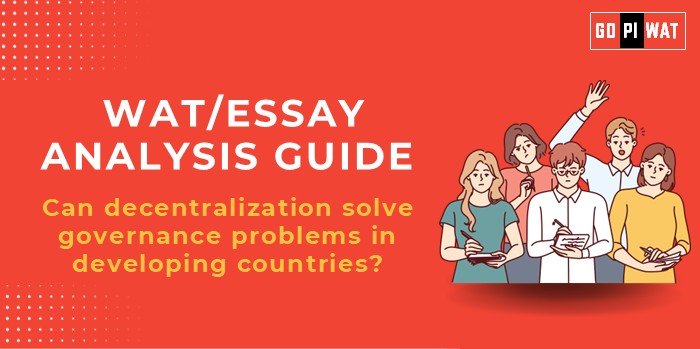📋 Written Ability Test (WAT)/Essay Analysis Guide
🌟 Topic: Can Decentralization Solve Governance Problems in Developing Countries?
🌐 Understanding the Importance
Decentralization is emerging as a transformative strategy for governance in developing nations. By transferring decision-making authority to local levels, it empowers communities to address specific needs, fosters inclusivity, and alleviates the inefficiencies of over-centralized systems—a critical focus for development-oriented policies and essays.
🕒 Effective Planning and Writing
- Time Allocation:
- Planning: 5 minutes (Outline key points and examples).
- Writing: 20 minutes (Focus on structured arguments and transitions).
- Review: 5 minutes (Check for coherence, grammar, and factual accuracy).
✨ Introduction Techniques
- Contrast Approach: “While centralized governance models often struggle with inefficiencies and fail to address local issues effectively, decentralized systems in countries like Kenya and Brazil have demonstrated the potential to improve public service delivery and transparency.”
- Solution-Based Approach: “Decentralization, by bringing governance closer to the people, offers a pragmatic solution to the myriad challenges of centralized systems, enabling localized and context-sensitive approaches to governance.”
📚 Structuring the Essay Body
🏆 Achievements:
- Kenya’s Devolution: Directed 15% of national revenue to counties, enhancing healthcare and education services.
- Brazil’s Participatory Budgeting: Implemented in 250 municipalities, fostered citizen trust and reduced corruption through transparent financial planning.
⚠️ Challenges:
- Capacity Gaps: Local authorities often lack trained personnel and administrative expertise, evident in South Africa’s struggles with decentralized governance.
- Resource Inequity: Poorer regions face challenges in generating revenue to sustain governance initiatives.
🔮 Future Outlook:
- Integrate Technology: Use platforms like Estonia’s digital governance to improve efficiency and accountability.
- Foster Partnerships: Work with international organizations to provide funding and expertise for capacity building.
🔗 Concluding Effectively
- Balanced Perspective: “Decentralization has the potential to address governance inefficiencies in developing nations but requires robust frameworks for capacity building, equitable resource distribution, and accountability mechanisms to succeed.”
- Global Example-Based Conclusion: “As demonstrated by Estonia’s digital governance and Kenya’s healthcare decentralization, successful models of decentralization are possible when supported by adequate infrastructure, technological integration, and local capacity building.”
💡 Recommendations for Sustainable Progress
- Capacity Building: Implement training programs for local government officials to enhance administrative efficiency.
- Technology Integration: Adopt digital tools for better resource management and transparency (e.g., Estonia’s e-governance).
- Global Partnerships: Leverage international funding and technical support to address resource and capacity disparities.
📝 Sample Short Essays
Balanced Perspective:
“Decentralization bridges the gap between governance and community needs, empowering local authorities to deliver effective solutions. However, its success depends on addressing resource inequities and building local administrative capacity.”
Solution-Oriented:
“By combining decentralization with modern technological solutions, governance in developing countries can become more inclusive and efficient, addressing challenges like resource mismanagement and lack of accountability.”
Global Comparison:
“Learning from Estonia’s digital governance and Kenya’s healthcare decentralization, developing countries can design frameworks tailored to local needs while leveraging global best practices for success.”


